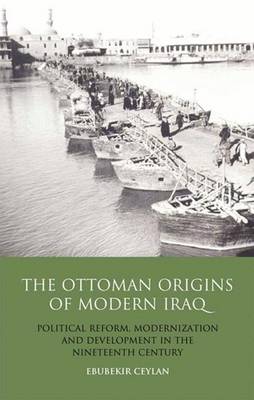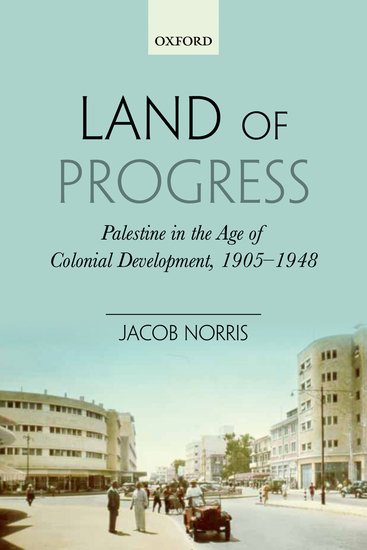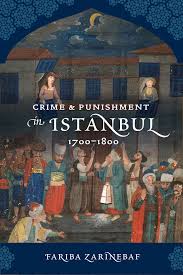-
Add to cartQuick view
Julia Phillips Cohen Becoming Ottomans: Sephardi Jews and Imperial Citizenship in the Modern Era Oxford: Oxford University Press, 2014. 219 pp.
Julia Phillips Cohen Becoming Ottomans: Sephardi Jews and Imperial Citizenship in the Modern Era Oxford: Oxford University Press, 2014. 219 pp.
$5.00Free!Add to cartQuick view -
Add to cartQuick view
Ebubekir Ceylan, The Ottoman Origins of Modern Iraq: Political Reform, Modernization and Development in the Nineteenth-Century Middle East. Library of Ottoman Studies, London and New York: I. B. Tauris, 2011, 297 pp.
Ebubekir Ceylan, The Ottoman Origins of Modern Iraq: Political Reform, Modernization and Development in the Nineteenth-Century Middle East. Library of Ottoman Studies, London and New York: I. B. Tauris, 2011, 297 pp.
$5.00Free!Add to cartQuick view -
Add to cartQuick view
Jacob Norris, Land of Progress: Palestine in the Age of Colonial Development, 1905-1948 Oxford: Oxford University Press, 2013. 241 pages.
Jacob Norris, Land of Progress: Palestine in the Age of Colonial Development, 1905-1948. Oxford: Oxford University Press, 2013. 241 pages.
$5.00Free!Add to cartQuick view -
Add to cartQuick view
The Palestinian Historiography of Family Leadership during the British Mandate
Free!This article seeks to expand the study of Palestinian Arab women’s self-identification and social and political activism by examining how Arab Christian women viewed, shaped, and managed their participation in the project of defining Palestinian national identity during the period of British colonial occupation. During the Mandate period, elite Christian women made particular use of mission schools and Christian women’s charitable organizations as platforms for promoting a vision of Palestinian nationalism as modern, nonsectarian, and politically progressive, in hopes of creating a Palestinian national identity in which they could claim a central role. As the Mandate wore on, though, it became increasingly evident that the presentation of Christian women as central to the expression of a broadly based, nonsectarian, modernizing, Westernizing Palestinian national identity was belied somewhat by the communal and class consciousness that education in elite Christian schools and membership in charitable organizations engendered. The way in which this purportedly middle-class, nonsectarian nationalist vision was developed and articulated in highly class- and communally conscious venues ultimately limited its purview and linked it with oppressive colonial practices in the eyes of much of the Palestinian Arab population.
Add to cartQuick view -
Add to cartQuick view
Back to the Future: The Jerusalem Exhibit at the 1904 St. Louis World’s Fair
Free!The famous St. Louis World’s Fair of 1904 was a vast celebration of the new century and its promise of a future governed by technological and scientific progress. It is not often remembered that in the heart of this paean to modernity stood an enormous and astonishingly life-like replica of the Old City of Jerusalem. Evoking the past rather than the future and transcendence rather than materiality, what was Jerusalem doing in the St. Louis Fair? How did its presence challenge, complicate, or legitimize the popular narratives of modernization with which it was surrounded? Through a description of the fair and the replica—and contra theories that continue to adhere to the secularization thesis and its structuring binaries—this essay is an examination of the preservation and deployment of religious themes and symbols within modernity.
Add to cartQuick view -
Add to cartQuick view
Being Muslim and European Without Contradiction—Myth or Reality?
Free!The article reviews a critique of European modernity through the eyes of Bassam Tibi, a European Muslim sociologist. Tibi’s discursive analysis presents a detailed description of how an Islamic pluralism addresses the conceptual, philosophical, cultural, social, and political interpretations of Islam in a European context. His Islamic pluralism suggests the ways in which a secular interpretation of Islam can influence religion-state relations in Europe. Exploring the tensions resulting from being both Muslim and European, Tibi proposes that Muslims in Europe avidly maintain some basis of Islam within their identity, even if they adapt that interpretation to make it compatible with European norms and values. His perspectives are juxtaposed with Muslim intellectual opposition to a European Islamic pluralism that offers a basis for Islamic diversity in Europe. The article concludes that even Tibi’s moderate interpretation of Islam does not fully eliminate the inherent contradiction involved in being both Muslim and European, although he does suggest a means of bridging cross-cultural tensions.
Add to cartQuick view -
Add to cartQuick view
Fariba Zarinebaf, Crime and Punishment in Istanbul, 1700–1800. Berkeley, University of California Press, 2010. 304 pp.
Fariba Zarinebaf, Crime and Punishment in Istanbul, 1700–1800. Berkeley, University of California Press, 2010. 304 pp.
$5.00Free!Add to cartQuick view -
Add to cartQuick view
The Forces of Presence and Absence : Aspects of Palestinian Identity Transformation in Israel between 1967 and 1987
Free!This article examines Palestinian identity transformation in Israel during the years between 1967 and 1987. Fifteen Palestinian novels and autobiographies were published in Israel during this period. My article will focus on a group of five from among them that I call counteraction novels. Counteraction novels show the failure of the Zionist modernist paradigm—according to which modernization and integration of Palestinians in Israel are complementary processes—by reflecting a Palestinian distinction between modernism and Zionism. On the one hand, the novels reflect that Palestinians in Israel are grappling with issues posed to them by modernization. On the other hand, counteraction novels present a uniform rejection of Zionism’s erasure and alienation of Palestinians in Israel. I also argue that counteraction novels do not portray a “positive” Palestinian identity; they do not voice what Palestinian identity is.
Add to cartQuick view
- Home
- About JLS
- Issues
- Vol. 9 No. 1 | Summer 2019
- Vol 8 No 2 Winter 2018
- Vol. 8, No. 1: Summer 2018
- Vol. 7, No. 2: Winter 2017
- Vol. 7, 1: Summer 2017
- Vol. 6, Summer/Winter 2016
- Vol. 5, No. 2 Winter 2015
- Vol. 5, No. 1 Summer 2015
- Vol. 4, No. 2 Winter 2014
- Vol. 4, No. 1 Summer 2014
- Vol. 3, No. 2 Winter 2013
- Vol. 3, No. 1 Summer 2013
- Vol. 2, No. 2 Winter 2012
- Vol. 2, No. 1 Summer 2012
- Vol. 1, No. 2 Winter 2011
- Vol. 1, No. 1 Summer 2011
- Blog
- dock-uments
- Subscribe
- Submit
- Contact





